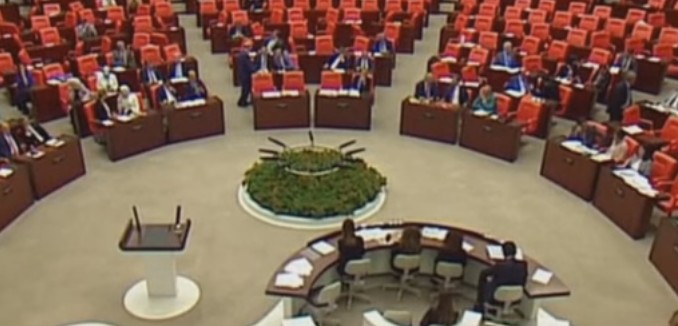Israel on Saturday praised the Turkish parliament’s adoption of a reconciliation agreement reached between Ankara and Jerusalem in June.
“Israel welcomes the ratification of the agreement by the Turkish parliament, and anticipates the continued implementation [of the deal], including the [mutual] return of ambassadors,” the Prime Minister’s Office said in a statement hours after the vote.
The deal’s approval sets the stage for greater cooperation and a higher level of diplomatic relations between the two countries.
Under the terms of the agreement, Israel will pay $20 million in compensation to the families of the ten Turkish nationals who were killed during the IDF’s 2010 raid on the Mavi Marmara. The ship, which was under the control of the Turkish Humanitarian Relief Foundation—a group designated as a terror organization by the Netherlands and Germany—was part of a flotilla attempting to break Israel’s legal naval blockade of the Hamas-ruled Gaza Strip. IDF troops faced an “organized and violent” assault from a group of passengers after boarding the ship, according to a UN report and video footage. Ten crew members were killed in the ensuing fight, and several Israeli soldiers were injured. The other ships in the flotilla were diverted without incident.
The incident led to a six-year rift between Israel and Turkey. After an agreement to restore diplomatic ties between the two countries was announced at the end of June, Israel’s former national security advisor observed that it held significant economic potential. “Trade between Israel and Turkey has more than doubled from the Marmara event up until today,” Maj. Gen. (ret.) Yaakov Amidror said, adding that the deal will bolster that growth with “joint projects in government level. People are speaking about gas and there are other issues that might emerge.”
According to analysts, renewed ties with Turkey will be a boon for Israel’s natural gas export business. Israeli energy stocks and shares in Turkey’s Zorlu Energy rose when the agreement was announced in June.
The reconciliation deal with Turkey comes as Israel continues making diplomatic progress — official and unofficial — in the region and beyond.
Ayoob Kara, Israel’s deputy minister of regional cooperation, said earlier this month that “relations with our neighbors are the best they’ve ever been.” Israel recently opened a diplomatic mission in the United Arab Emirates, hosted Egypt’s foreign minister, and welcomed a high-level Saudi delegation.
Israeli Prime Minister Benjamin Netanyahu is also preparing to meet with the leaders of a number of African nations while visiting New York next month for the United Nations General Assembly. The planned meeting is the latest signs of Israel’s increased engagement with the African continent.
Netanyahu visited Uganda, Kenya, Rwanda, and Ethiopia on a historic tour of East Africa in July. Weeks later, the Republic of Guinea, a Muslim-majority African nation, restored diplomatic ties with Israel after a 49-year break. Netanyahu has made it a priority to strengthen Israel’s commercial, diplomatic, and security relations with African countries. Israel has a long history of sharing its expertise on the continent, and Jerusalem hopes that increased ties with African nations will lead to a shift in their voting trends at the UN and other global fora, thus improving Israel’s diplomatic standing and reversing what Netanyahu called “the automatic majority against Israel.”
[Photo: euronews (in English) / YouTube ]




